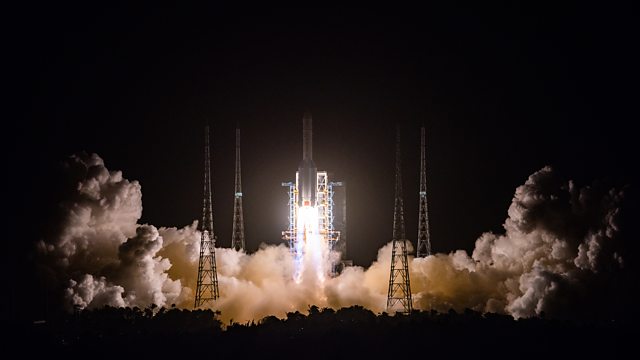Youngest rock samples from the moon
Youngest samples from lava flows on the moon returned by Chang’e-5 mission. Also, 10,000 years of hepatitis B virus, predicting cyclones, and the 2021 Nobel Prizes for Science.
In December 2020, China's Chang'e-5 mission returned to earth carrying rock samples collected from the moon – the first lunar samples to be collected since the American Apollo and Luna missions to the moon in the 1970s. Laboratory analysis has revealed that these are the youngest samples of rocks to be collected from the moon. Lunar geologist Katherine Joy explains what this tells us about the moon’s volcanic past.
Also on the programme, a recent study reveals that the hepatitis B virus has been infecting humans for at least 10,000 years. Denise Kühnert from the Max Planck Institute for the Science of Human History shares what the evolution of the virus tells us about human evolution, as well as the rise and fall of civilisations.
In the wake of Cyclone Shaheen, we also speak to Princeton University’s Ning Lin about how climate modelling can help us predict tropical storms in the Arabian Sea, and Fredi Otto joins us to discuss the 2021 Nobel Prizes for Science.
(Image: Getty Images)
Presenter: Roland Pease
Producer: Samara Linton
Last on
More episodes
Broadcasts
- Thu 7 Oct 2021 19:32GMT����ý World Service
- Fri 8 Oct 2021 03:32GMT����ý World Service Australasia, South Asia & East Asia only
- Fri 8 Oct 2021 04:32GMT����ý World Service Americas and the Caribbean
- Fri 8 Oct 2021 08:32GMT����ý World Service
- Fri 8 Oct 2021 12:32GMT����ý World Service Australasia, Online, UK DAB/Freeview, News Internet & Europe and the Middle East only
- Sun 10 Oct 2021 01:32GMT����ý World Service Americas and the Caribbean & News Internet only
Podcast
-
![]()
Science In Action
The ����ý brings you all the week's science news.


